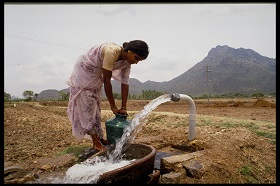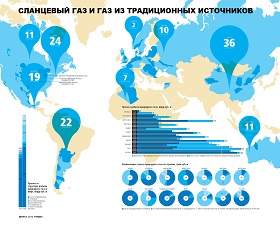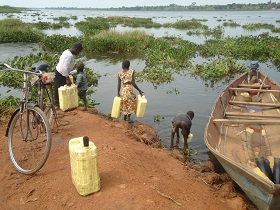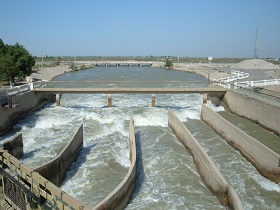Developed countries’ transition to postindustrial society in the late 20th century entailed the reevaluation of the role different factors play in economic growth. Natural resources ceased to be regarded as a significant prerequisite for economic development, due to the emergence of service industries and the virtual economy. Furthermore, the idea that natural riches could even hinder economic development gained ground.
It is now becoming increasingly clear that the conclusions drawn about natural resources’ secondary role were somewhat hasty. There is every reason to believe that in the 21st century their role in the world economy and international political processes will only increase. This is due to structural changes in the energy markets, growing scarcity of certain types of renewable resources, and worsening environmental problems.
Breakthroughs in the production of new types of hydrocarbons (from tar sands to shale gas) and the rapid development of renewable energy technologies have put an end to the long debate on the impending exhaustion of energy resources. However, it has not stabilized the global energy sector. Soaring demand in Asian countries and the shale revolution in the United States have radically altered the energy trade. While the increase in the LNG trade makes the market more flexible, it also poses a threat to the stability of pipeline deliveries. Increased oil supply due to the emergence of new major actors (Canada, the United States, and – in the future – Brazil) will reduce the market’s dependence on the turbulent political events in the Middle East, but will also inevitably lead to a diminishing of the role played by OPEC, which used to perform an important stabilizing function.
Further economic growth will exacerbate imbalances already present in regional markets. China and India are close to reaching the maximum coal production (“peak coal”), which signifies the end of their cheap energy supply and growing difficulties in retaining industrial production. By contrast, cheap energy resulting from the shale revolution has already kick-started the re-industrialization processes in the United States. Supplying energy to Africa, where the demand is set to increase rapidly in the wake of demographic and economic growth, poses another problem.
If the exhaustion of oil resources had been expected since the end of the 19th century, just a few decades ago it would have been impossible to imagine that fresh water would become the scarce resource it is today. However, the 1995 warning by Ismail Serageldin, Vice-President of the International Bank for Reconstruction and Development, that “if the wars of the 20th century were fought over oil, the wars of the 21st century will be fought over water,” is cited ever more frequently.
Currently, 2.8 billion people live in areas suffering from water scarcity, and by 2030 their number is expected to reach 3.9 billion. Water “stress” is already apparent in India, Saudi Arabia, Mexico, Iran, Kazakhstan, and Spain. Within a decade, these countries will be joined by the United States and China.
About 70 percent of water is used in agriculture. Irrigated lands that are mainly located in areas of “water stress” provide about 40 percent of the world’s primary food output. Since water scarcity largely determines land degradation, the lack of water is gradually becoming a major restraint on the growth in food supply. These factors, along with rising demand for food in Asian countries, increasing energy prices, slowing technological progress in agriculture and more frequent droughts (mainly due to climate change), led to food prices rising 83 percent over the years 2005-2008. 2011 saw a new record high. In 2009, over 1 billion people were starving – another historical record. Since the food crisis is largely caused by structural reasons, there is a strong possibility that the world has finally entered the era of high food prices.
The food crisis is worsened by the critical state of the fish resources, which in some countries form the main source of animal protein in the diet. Massive catches and habitat changes caused by pollution, climate change and dam construction have been exhausting world fish resources at an unprecedented pace. If the rate of decline in fish populations remains unchanged, by the middle of the 21st century fish resources will disappear from the face of the earth. However, this is just an illustrative assumption, since in reality the catch rate will decline in line with falling population size.
Global environmental problems are attracting increased attention from the international community. These problems have long been present, but have never before been considered a factor that significantly affects the global economy in the long run. The problem of the mass use of DDT in the 1960s was quickly resolved by changing agricultural practices, and that of ozone depletion in the 1980s-1990s was resolved by introducing alternative technologies in refrigerating and spray industries. There are no easy solutions to the major environmental problem of our time, namely climate change, which necessitates a radical restructuring of the global energy system. Climate change resulting from the lack of fresh water, food scarcity, natural disasters, migration, and the development prospects of key industries (energy, transport, construction, agriculture) has become an integral aspect of today’s major economic and political issues.
It is no surprise that the most representative international conference in world history, which took place in Copenhagen in 2009 and brought together 119 heads of states and governments, was about climate change. Given existing international institutions’ clear inability to mitigate the problem (the level of greenhouse gas emissions is rising constantly), and the growing damage inflicted by the further increase in the average temperature, we have every reason to expect climate change to generate even more interest in the years to come.
Many regional and local environmental problems that once only sparked concern from local residents and environmental activists today exert ever more influence on global processes, especially if they take place in the world’s leading countries. Thus, China openly recognizes air pollution to be a domestic restraint on the country’s economic growth, while aridization of grain production areas in northern China threatens its food security. Increased attention to environmental issues is also prompted by humanitarian considerations. Soil erosion and underground water depletion intensify starvation in rural countries across Asia and Africa, while bad drinking water kills more people than AIDS and wars together.
Pollution increasingly acquires a transboundary nature. A considerable amount of polluting substances contained in the atmosphere of Japan and South Korea (in some cases even of the United States), originates in China. Pollution is easily spread through transboundary water basins. There are 263 of them in the world, and many become conflict zones as a result of either excessive water intake by the up-river countries or their pollution with toxic substances. Conflicts between Russia and China caused by toxic waste discharge by Chinese enterprises into the Amur in 2005 and 2010 are a clear illustration of this. Downriver countries, in turn, can disrupt spawning routes of commercial fish.
The aggravation of resource and environmental problems leads to significant structural changes in the global economy and international relations. This is evidenced by the growing importance attached to territory size. Advocates of globalization argued not so long ago that territory size no longer played an important role due to the shrinking economic space that resulted from progress in IT. But today territory size is considered the most important source of wealth, i.e. arable lands and pastures, water resources, forests, as well as subsoil assets – even where extraction is, as yet, not economically viable, but where it could become quite profitable in the near future.
Territories that have not yet played a key role in international relations attract more and more attention. Thus, the Arctic faces increased international rivalry, although for the time being evaluating natural resources there (according to some of sources, the region accounts for a quarter of the world's hydrocarbon reserves) is predominantly speculative. The accelerated development of Africa is underway. Since it is carried out mainly by large corporations (primarily Chinese companies), and often involves the purchase of large plots of land, some see it as a new wave of colonization. Be that as it may, thanks to their resources, many African countries are showing record-high rates of economic growth. New prospects are opening up for the Russian Far East and Siberia. If the vast areas of eastern Russia were openly labeled a burden in the 1999 Presidential Address to the Federal Assembly, in 2013 their development was called “the national priority for the entire 21st century.” In recent years international disputes have even gained ground over Antarctica, although this territory has long been on the sidelines of world politics.
The increased importance of territory sees the geopolitical focus return to the system of international relations. A theory that was viewed as outdated against the background of the post-industrial society seems to describe the actions of nations in the modern world quite adequately. This geopolitics is easily revealed by intensified conflicts in the Asia-Pacific region (particularly in the South China and East China Seas), the struggle for the Arctic, the “new colonization” of Africa, and, in a way, even the international crisis around Ukraine.
The global economy is also undergoing substantial shifts. The rising cost of natural resources has put on the agenda the need to promote green economic growth providing for decoupling improved living standards from increased strain on natural resources. Technologies that form the basis of green growth are a prerequisite for ensuring the competitiveness of national economies. To stimulate their development, countries are adopting expensive public investment programs (e.g. green growth in Korea) and are introducing new mechanisms to regulate environmental impact (e.g. system for trading greenhouse gas emission allowances). The developed world is rapidly moving to a state where any contamination will require reimbursement, the size of which will increase in line with worsening environmental problems.
Against the background of these new conditions, the competitive advantages of natural-resource rich countries will inevitably grow. This includes Russia. However, mere possession of significant energy, water, land, fish and forest resources is not enough, since they must be used wisely, e.g. it is important to develop agriculture and produce water-consuming and power-intensive products for export (primarily to neighboring Asian countries suffering from water and power shortages). We should use our energy resources not for the export of unprocessed raw materials, but make it the core of the high-tech energy complex, which includes not only production, but also numerous industrial and service sectors. We should protect our natural environment and use its potential for the country’s economic and spiritual development.








